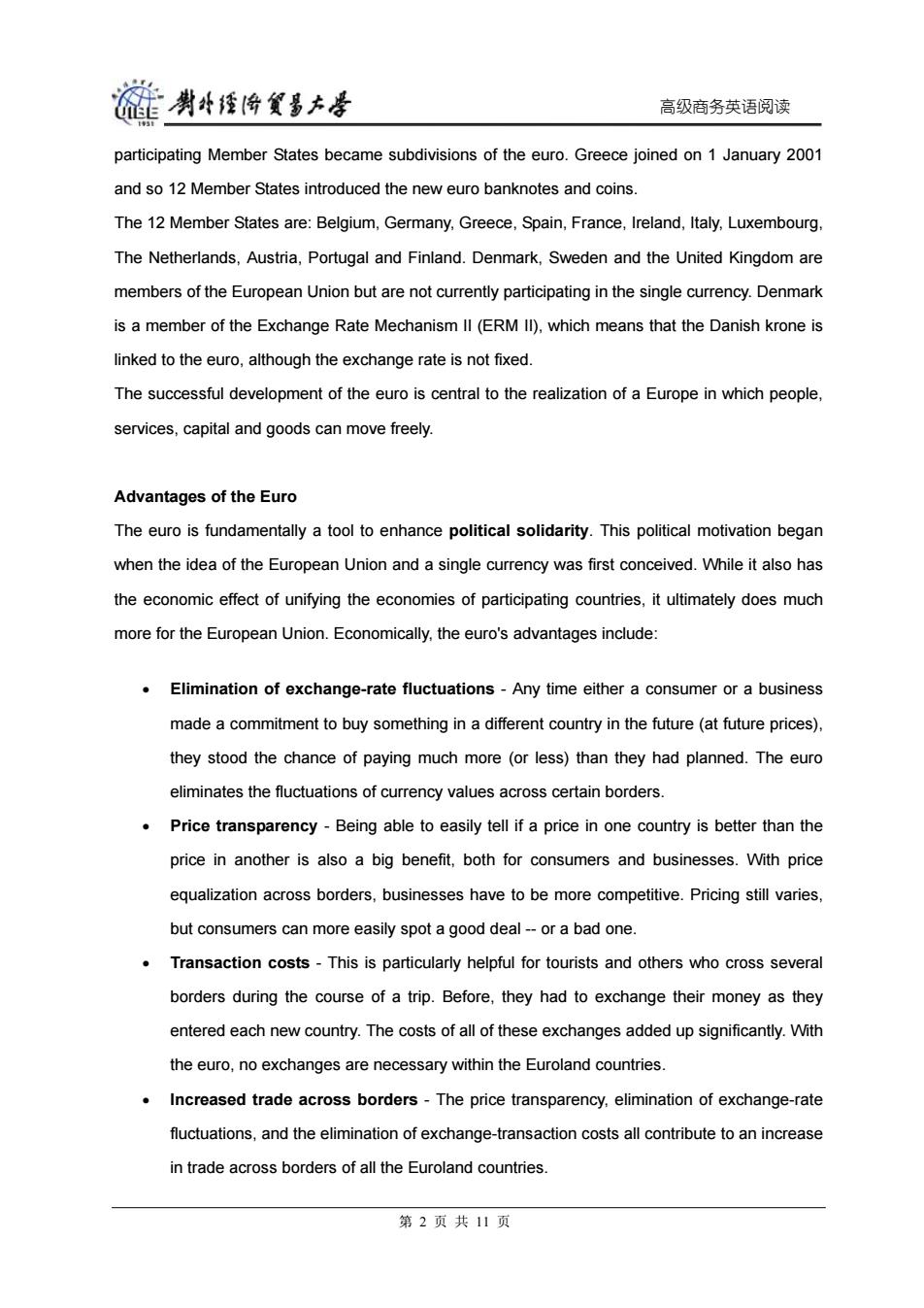正在加载图片...

雒勇降贸多大是 高级商务英语阅读 participating Member States became subdivisions of the euro.Greece joined on 1 January 2001 and so 12 Member States introduced the new euro banknotes and coins. The 12 Member States are:Belgium,Germany,Greece,Spain,France,Ireland,Italy,Luxembourg, The Netherlands,Austria,Portugal and Finland.Denmark,Sweden and the United Kingdom are members of the European Union but are not currently participating in the single currency.Denmark is a member of the Exchange Rate Mechanism Il(ERM II),which means that the Danish krone is linked to the euro,although the exchange rate is not fixed. The successful development of the euro is central to the realization of a Europe in which people, services,capital and goods can move freely. Advantages of the Euro The euro is fundamentally a tool to enhance political solidarity.This political motivation began when the idea of the European Union and a single currency was first conceived.While it also has the economic effect of unifying the economies of participating countries,it ultimately does much more for the European Union.Economically,the euro's advantages include: Elimination of exchange-rate fluctuations-Any time either a consumer or a business made a commitment to buy something in a different country in the future(at future prices), they stood the chance of paying much more(or less)than they had planned.The euro eliminates the fluctuations of currency values across certain borders. Price transparency-Being able to easily tell if a price in one country is better than the price in another is also a big benefit,both for consumers and businesses.With price equalization across borders,businesses have to be more competitive.Pricing still varies, but consumers can more easily spot a good deal--or a bad one Transaction costs-This is particularly helpful for tourists and others who cross several borders during the course of a trip.Before,they had to exchange their money as they entered each new country.The costs of all of these exchanges added up significantly.With the euro,no exchanges are necessary within the Euroland countries. Increased trade across borders-The price transparency,elimination of exchange-rate fluctuations,and the elimination of exchange-transaction costs all contribute to an increase in trade across borders of all the Euroland countries. 第2页共11页高级商务英语阅读 participating Member States became subdivisions of the euro. Greece joined on 1 January 2001 and so 12 Member States introduced the new euro banknotes and coins. The 12 Member States are: Belgium, Germany, Greece, Spain, France, Ireland, Italy, Luxembourg, The Netherlands, Austria, Portugal and Finland. Denmark, Sweden and the United Kingdom are members of the European Union but are not currently participating in the single currency. Denmark is a member of the Exchange Rate Mechanism II (ERM II), which means that the Danish krone is linked to the euro, although the exchange rate is not fixed. The successful development of the euro is central to the realization of a Europe in which people, services, capital and goods can move freely. Advantages of the Euro The euro is fundamentally a tool to enhance political solidarity. This political motivation began when the idea of the European Union and a single currency was first conceived. While it also has the economic effect of unifying the economies of participating countries, it ultimately does much more for the European Union. Economically, the euro's advantages include: • Elimination of exchange-rate fluctuations - Any time either a consumer or a business made a commitment to buy something in a different country in the future (at future prices), they stood the chance of paying much more (or less) than they had planned. The euro eliminates the fluctuations of currency values across certain borders. • Price transparency - Being able to easily tell if a price in one country is better than the price in another is also a big benefit, both for consumers and businesses. With price equalization across borders, businesses have to be more competitive. Pricing still varies, but consumers can more easily spot a good deal -- or a bad one. • Transaction costs - This is particularly helpful for tourists and others who cross several borders during the course of a trip. Before, they had to exchange their money as they entered each new country. The costs of all of these exchanges added up significantly. With the euro, no exchanges are necessary within the Euroland countries. • Increased trade across borders - The price transparency, elimination of exchange-rate fluctuations, and the elimination of exchange-transaction costs all contribute to an increase in trade across borders of all the Euroland countries. 第 2 页 共 11 页